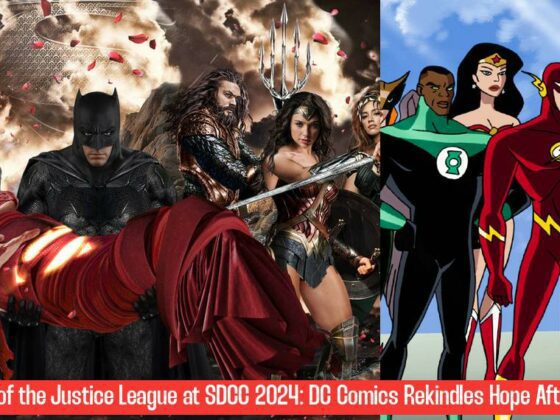Suicide Squad: Kill the Justice League second season gets last minute delay
The anticipation was palpable. Fans were eager to dive into the next chapter of the Suicide Squad: Kill the Justice League saga, with the second season set to launch on July 11th. However, a last-minute delay has thrown a wrench in those plans, leaving players wondering what’s next for the game that seemed to have fallen short of expectations.
Rocksteady, the developer behind the game, announced the postponement via a brief post on X (formerly Twitter), expressing gratitude for fans’ patience. The new launch date is now set for July 25th. While the company didn’t provide a specific reason for the delay, it’s hard not to speculate about the underlying factors. Could it be that Rocksteady is working overtime to address feedback surrounding the game’s performance and reception? Or perhaps they are fine-tuning the new content to ensure a smoother and more engaging experience for players?
The second season promises to deliver thrilling new content, including the introduction of Nora Freeze, Mr. Freeze’s icy wife, as a playable character. This addition will enhance the game’s roster, bringing a unique set of abilities and playstyles to the Suicide Squad. In addition to Nora, the season will boast new weapons, another map, and two episodes titled “Frozen Hearts” and “Winter,” hinting at a frosty and intense storyline.
A roadmap unveiled earlier this year outlined Rocksteady’s plans for two additional seasons, suggesting a continuing commitment to expanding the Suicide Squad: Kill the Justice League universe. These future seasons are expected to introduce even more playable characters and gear, keeping players invested in the game’s long-term development.
The Game’s Struggles and the Delay’s Significance
Suicide Squad: Kill the Justice League‘s initial release didn’t meet the expectations set by Rocksteady and publisher Warner Bros. The game faced a barrage of criticism, with several reports suggesting that it fell short of its potential. Warner Bros. Discovery’s chief financial officer, Gunnar Wiedenfels, acknowledged the game’s underperformance, revealing that it had resulted in a $200 million revenue loss for the company.
A report published in July shed light on the factors that may have contributed to the game’s struggles. A culture of perfectionism, a potentially ill-suited genre pivot, and a continuously shifting vision were cited as key reasons for the game’s underwhelming reception. These internal challenges may have put significant strain on the development process, potentially leading to the delay of the second season.
Despite its shortcomings, Suicide Squad: Kill the Justice League still showcases Rocksteady’s talent, as recognized by Eurogamer’s Chris, who awarded it a respectable three out of five stars. The delay of the second season could be seen as an opportunity for Rocksteady to address the game’s issues and deliver a more polished and engaging experience for players. Whether the delay will ultimately contribute to the game’s success remains to be seen, but it’s definitely a crucial moment for Rocksteady to regain player trust and demonstrate their commitment to delivering a satisfying gaming experience.
The Future of Suicide Squad: Kill the Justice League
The delay of the second season has sparked discussions about the game’s future. It’s a pivotal moment for Suicide Squad: Kill the Justice League and its creators. Will the delay allow Rocksteady to refine the game’s mechanics, address player feedback, and ultimately deliver a compelling experience that lives up to the franchise’s potential? Or will the game continue to struggle with the shadow of its initial underperformance?
The reception of the second season will be crucial for the game’s long-term success. If Rocksteady can deliver a significant upgrade in terms of gameplay, content, and overall polish, it might be able to win back players and garner positive reviews. However, if the second season fails to address the shortcomings, it could further diminish the game’s appeal and lead to a decline in its player base.
The delay of the second season is a reminder that even established studios can face challenges in the ever-evolving world of gaming. While the immediate reaction to the news might be disappointment, it’s essential to look at it as an opportunity for Rocksteady to refine their vision and deliver a better gaming experience. The future of Suicide Squad: Kill the Justice League now rests on the success of the upcoming season. It’s a chance for Rocksteady to prove that they can overcome their initial setbacks and deliver a game that truly lives up to its potential.
The Impact on the Gaming Industry
The delay of Suicide Squad: Kill the Justice League‘s second season highlights the increasing pressure and scrutiny faced by game developers in today’s competitive landscape. With the rise of live-service games and the demand for constant updates, developers are constantly striving to meet player expectations and deliver engaging content.
The game’s underperformance and the subsequent delay serve as a reminder of the risks associated with the live-service model. While it can create a strong sense of community and long-term engagement, it also demands ongoing investment and commitment from developers to keep players invested. A single misstep can have a significant impact on a game’s reputation and financial success.
The gaming industry is constantly evolving, and developers must be adaptable and responsive to changing player demands. The delay of Suicide Squad: Kill the Justice League‘s second season is a testament to the challenges and uncertainties that come with creating and maintaining successful live-service games. It’s a reminder that even with established studios and franchises, there’s no guarantee of success, and developers must be willing to learn, adapt, and prioritize player feedback to ensure their games thrive in the competitive gaming landscape.
Key Takeaways
The delay of Suicide Squad: Kill the Justice League‘s second season sends a clear message to the gaming industry and its players: even established developers can face setbacks, and player feedback is crucial for the success of any game.
Here are some key takeaways from this situation:
- The live-service model demands constant attention and investment. Developers need to be constantly evolving their games, addressing player feedback, and delivering new content to keep players engaged.
- Player feedback is crucial. Listening to what players have to say and incorporating their suggestions can significantly improve a game’s overall quality and reception.
- Perfectionism can be a double-edged sword. While striving for excellence is essential, it’s important to strike a balance and avoid delays that could negatively impact a game’s release schedule.
- The gaming landscape is constantly evolving. Developers need to be adaptable and responsive to changes in player expectations and market trends.
The delay of Suicide Squad: Kill the Justice League‘s second season might be a setback, but it’s also an opportunity for Rocksteady to learn from its mistakes and deliver a better gaming experience. Only time will tell whether the delay will ultimately benefit the game, but the gaming industry will be watching closely to see how Rocksteady navigates this challenging situation.
What was the original launch date for the second season of Suicide Squad: Kill the Justice League?
The original launch date for the second season of Suicide Squad: Kill the Justice League was July 11th.
Why was the launch of the second season delayed?
The launch of the second season was delayed last minute, with the new date set for July 25th. The developer, Rocksteady, did not provide a specific reason for the delay.
What new content can players expect in the second season of Suicide Squad: Kill the Justice League?
Players can expect new content in the second season, including the introduction of Nora Freeze as a playable character, new weapons, another map, and two episodes titled “Frozen Hearts” and “Winter.”
What are Rocksteady’s plans for the future of Suicide Squad: Kill the Justice League?
Rocksteady has outlined plans for two additional seasons, aiming to introduce more playable characters and gear to keep players engaged in the game’s long-term development.



